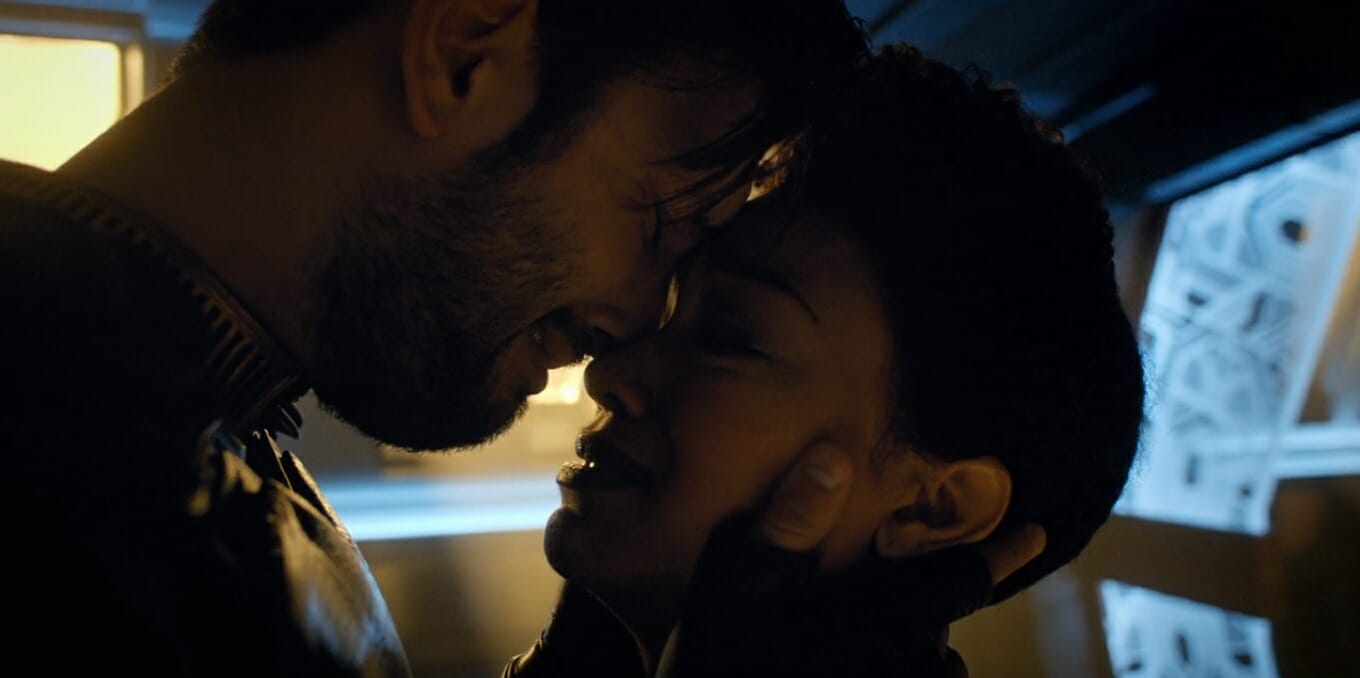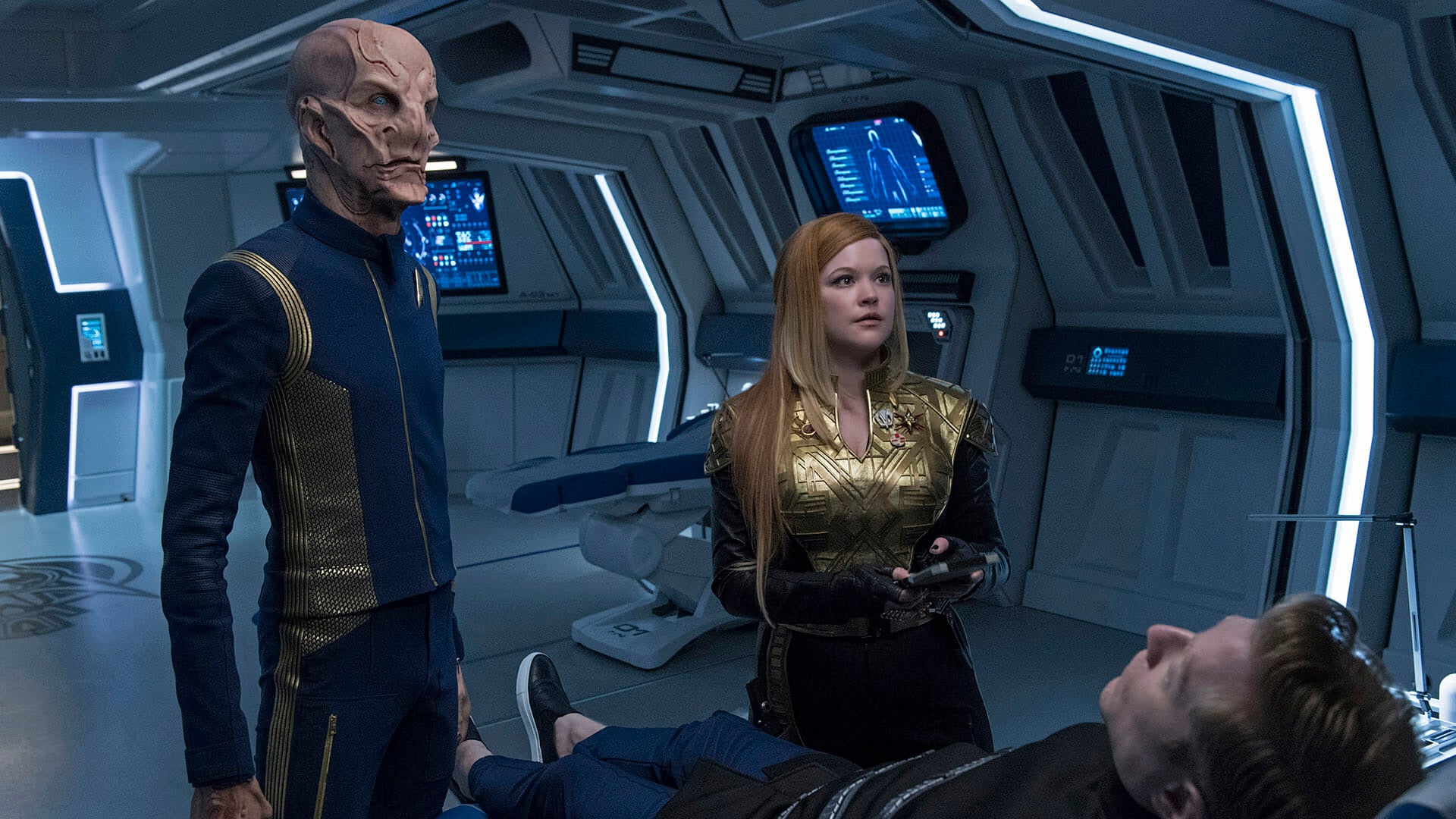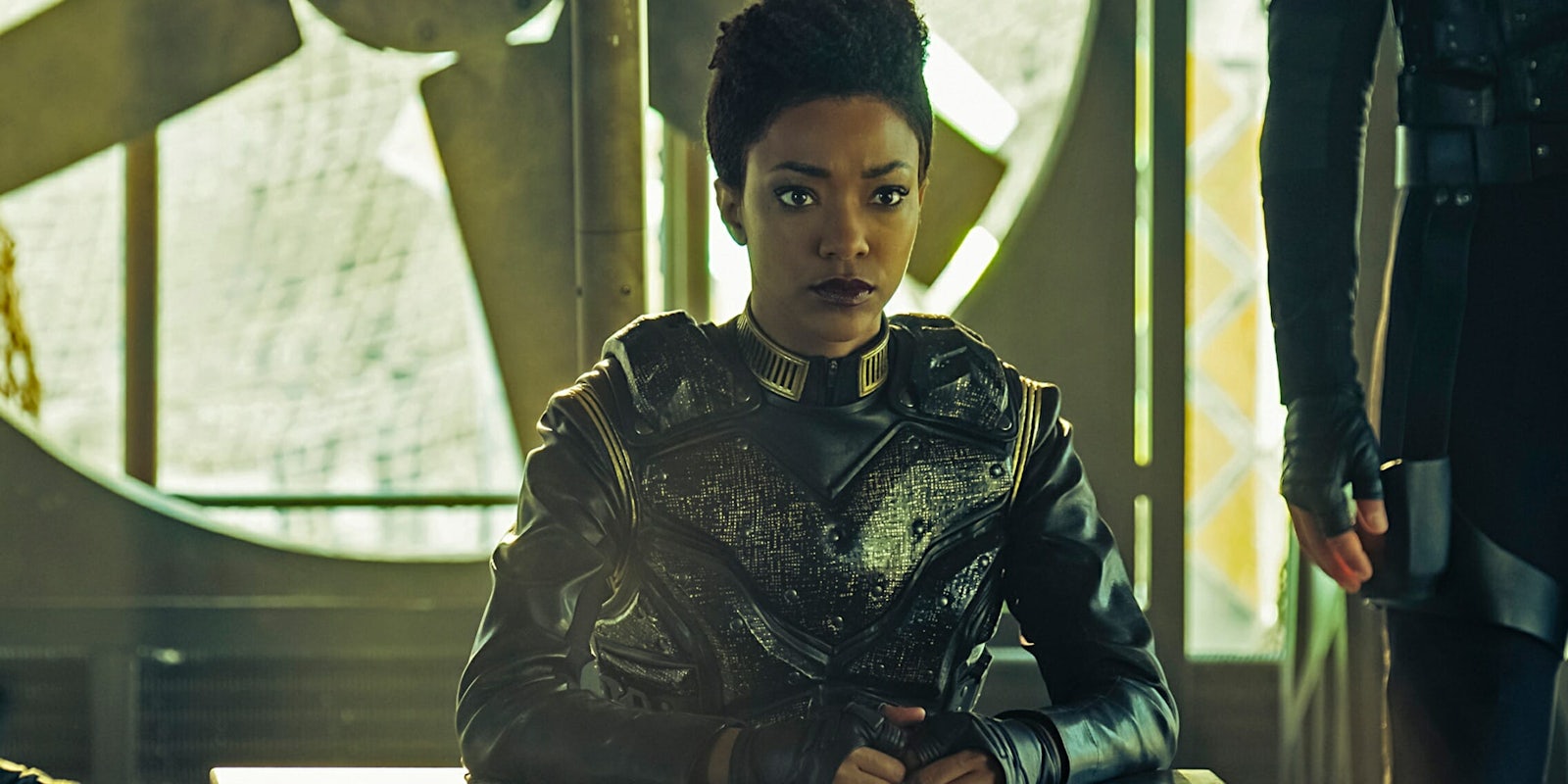For previous Star Trek: Discovery recaps, click here.
It took a dystopian alternate universe to show us what the Federation truly stands for.
Early in the show’s run, I complained that Discovery lacked the moral heart of previous Star Treks– partly because Captain Lorca is such an unpleasant person. He doesn’t provide the ethical leadership of a captain like Kirk or Picard, leaving his crew—a team of scientists and explorers—feeling uncertain and miserable during a war they didn’t want to fight. When Lorca made bad choices like torturing an animal to power the ship’s engine, his subordinates failed to speak up. That isn’t the kind of attitude we expect from wholesome Starfleet heroes, and as a Star Trek fan, it made me uneasy about the show’s overall vision.
As with most of Discovery‘s early problems, this resolved itself with time and patience. The Mirror Universe lays the issue to rest because it forces the main characters to articulate their own morality. Faced with the cruelty and xenophobia of the Terran Empire, Michael Burnham and her crewmates must consciously embody Starfleet ideals to maintain their own identity in an alien universe.
Last week: Star Trek: Discovery returns with a refreshing yet retro mid-season premiere
The Terran Empire’s main enemy is a ragtag group of rebels, combining three of the Federation’s founding species (Vulcans, Andorians, Tellarites) with the Klingons. A rebel alliance, if you will. Masquerading as her Mirrorverse counterpart, Michael Burnham is ordered to destroy a rebel stronghold, leading her to a difficult choice. To remain convincing in her role, she has to make a show of strength. But she can’t bring herself to kill the rebels, the galaxy’s last hope for freedom. Her solution is to beam down with Ash Tyler and meet their leaders, a goatee-bearded Sarek and Mirrorverse Voq, face to face.
The invisible Klingon
At last, the secret Klingon subplot comes to fruition! Mirrorverse Voq triggers Tyler’s suppressed memories, forcing him to acknowledge that he, too, is Voq. He reveals this to Michael back on the ship, where they fight before Mirror Saru (in this universe, a slave) takes him down. Obeying Terran law, Michael sentences Tyler/Voq to death in the vacuum of space, where the Discovery beams him to safety just in time.

This denouement was well worth the wait. Over the past few episodes, Michael and Tyler’s relationship deepened. Sonequa Martin-Green and Shazad Latif have fantastic chemistry, and it’s become one of the best-written romances in the Star Trek franchise. Starting out as puppy love, they became allies in a chaotic world. The Mirrorverse created parallels between their roles, each living undercover while infiltrating an alien crew. They acted as each other’s tether to home, but that connection was built on shaky ground. There’s no easy solution to their separation, but this episode opened up an interesting possibility that I previously assumed was a pipe dream.
In visiting the rebel base, Michael wanted to meet their leader, the Firewolf, aka Voq. She hoped to learn how he united the Klingons with other species, potentially sowing the seed for peace back home. Voq’s answer may not be much help (the Klingons needed a common enemy to fight alongside the others), but the important part is that Tyler/Voq was there as well. He saw that an alliance is possible, and beyond that, he really does love Michael. If Tyler’s feelings are as genuine as they seem, he can’t possibly emerge from this experience unscathed. Voq’s original identity—a Klingon cultural purist, obsessed with building a new Empire—is forever marred by Tyler’s human emotions and his life as a Starfleet officer. One day, this (and his relationship with Michael) may help bring an end to the war.
Stamets enters the forest
Back onboard the Discovery, Stamets is in a coma. Tilly tries to treat his brain with mycelium spores, which kill him before bringing him back to life. With little to do besides lie on a gurney and look ill, Stamets ends the episode on an intriguing note. He finally enters the “forest” we’ve heard so much about, with Stamets astral projecting onto the mycelial pathways—and meeting his Mirrorverse counterpart. Mirror Stamets must have developed some similar spore technology, allowing them to communicate on a different plane of existence.

This episode barely tackled Culber’s death, an event that put a black mark on Discovery‘s reputation for many viewers. The showrunners and actor Wilson Cruz have since assured us that Culber will return, and his relationship with Stamets will be an ongoing part of the show. In other words, this isn’t a case of “bury your gays,” the trope where TV shows introduce queer characters and then kill them off. But is it really that simple? To viewers who don’t read cast interviews (most of the audience), Culber is dead. And if queer representation was a key reason why you watched the show, you have every right to feel pissed about Culber’s demise.
It’s one of those situations where equal treatment isn’t necessarily the same as fair treatment. In a show like Discovery, where terrible things happen to every character, it makes sense for the one long-term couple to have this kind of traumatic storyline. In that sense, Culber and Stamets are getting the same treatment as a straight couple in a similar scenario. But it’s not really the same, because we’ve already seen thousands of straight couples leading happy lives on TV. We rarely see queer couples get the same kind of screentime, and it’s even more unusual in genre fiction. For Star Trek, it’s a first. I’m happy to wait and find out what happens next for Culber and Stamets, but I’m aware that I do so from an easier perspective than certain other fans. It’s undoubtedly different for queer men who waited decades to see themselves represented in a show like Star Trek, only to have those characters suffer and die within a handful of episodes.
Georgiou returns
Clad in a deliciously showy outfit and armed with a sword, Michael’s mentor Philippa Georgiou (Michelle Yeoh) is the Mirrorverse’s Terran Emperor. Her return is a fantastic way to bring Michael’s arc full circle, offering a bittersweet reunion while allowing Michael to show how she’s grown and matured since Georgiou’s death.
We didn’t see much of Lorca this week, which (like Stamets and hopefully Saru) means he’ll get more screentime in the last few episodes. What we did see, however, was as enigmatic as ever. When Georgiou appeared at the end, was that a smirk of recognition from Lorca? That could count in favor of the “Lorca is secretly from the Mirrorverse” theory, meaning he tried to assassinate Georgiou before arriving in Starfleet’s universe. Rather than doing so for personal gain, could he have done it for the Rebel cause?
Lorca’s motives are always mysterious, but while he’s less trustworthy and compassionate than the other Starfleet characters, he still seemingly wants to protect the Federation and defeat the Klingons. This could reflect the mindset of someone who grew up in a place of violence and terror, and accidentally found himself in a more utopian universe. He wants to maintain that newfound peace, but he uses Mirrorverse methods and morality to do so. That’s just a theory for now, but it certainly fits his “ends justify the means” mentality.
Final thoughts
- How does Spock exist in this universe? We can still imagine Sarek having a kid with a human, but how did Spock become an officer in the xenophobic Terran Empire? He’s there onboard the Enterprise in the TOS episode “Mirror, Mirror,” after all.
- I liked how career-focused Tilly was this week. Now she’s seen that she can be a captain (albeit an evil one), she’s gained more confidence and actively asks for a promotion. A welcome nod to the fact that Star Trek has always been a workplace drama, even during high-stakes periods like this.
- Are we going to get some more Saru character development soon? We only have four episodes left this season, and he’s definitely the most under-served character in the show!
For more Star Trek: Discovery recaps, click here.


